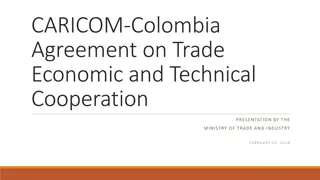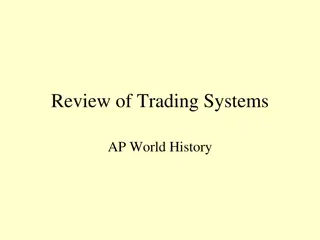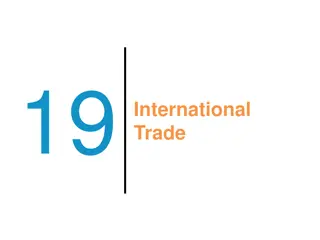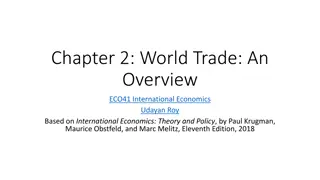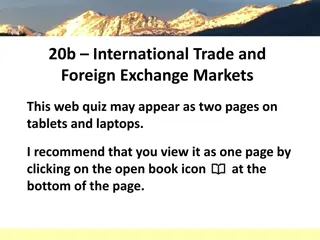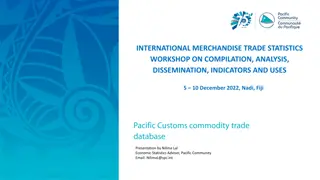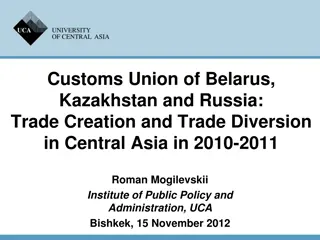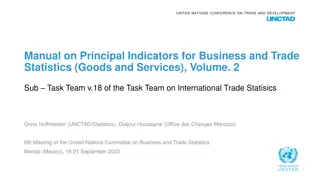
Understand Trade: Definitions of Key Terms in Economics
Explore essential trade concepts such as trade, tariff, production costs, specialization, nontariff barriers, NAFTA, and protectionism in this informative glossary. Enhance your knowledge of global economics and commerce.
Download Presentation

Please find below an Image/Link to download the presentation.
The content on the website is provided AS IS for your information and personal use only. It may not be sold, licensed, or shared on other websites without obtaining consent from the author. If you encounter any issues during the download, it is possible that the publisher has removed the file from their server.
You are allowed to download the files provided on this website for personal or commercial use, subject to the condition that they are used lawfully. All files are the property of their respective owners.
The content on the website is provided AS IS for your information and personal use only. It may not be sold, licensed, or shared on other websites without obtaining consent from the author.
E N D
Presentation Transcript
Trade Glossary Can you define these terms?
Trade Trade is a basic economic concept involving the buying and selling of goods and services, with compensation paid by a buyer to a seller, or the exchange of goods or services between parties. Definition by
Tariff A tariff is a tax imposed by one country on the goods and services imported from another country. Definition by
Production costs Production costs refer to all of the direct and indirect costs businesses face from manufacturing a product or providing a service. Production costs can include a variety of expenses, such as labor, raw materials, consumable manufacturing supplies, and general overhead. Definition by
Specialization Specialization is a method of production whereby an entity focuses on the production of a limited scope of goods to gain a greater degree of efficiency. Many countries, for example, specialize in producing the goods and services that are native to their part of the world, and they trade them for other goods and services. Definition by
Nontariff barrier A nontariff barrier is a way to restrict trade using trade barriers in a form other than a tariff. Nontariff barriers include quotas, embargoes, sanctions, and levies. As part of their political or economic strategy, some countries frequently use nontariff barriers to restrict the amount of trade they conduct with other countries. Definition by
NAFTA The North American Free Trade Agreement (NAFTA) was implemented to promote trade between the U.S., Canada, and Mexico. The agreement, which eliminated most tariffs on trade between the three countries, went into effect on Jan. 1, 1994. Definition by
Protectionism Protectionism refers to government policies that restrict international trade to help domestic industries. Protectionist policies are usually implemented with the goal to improve economic activity within a domestic economy but can also be implemented for safety or quality concerns. Definition by
Intellectual property Intellectual property is a broad categorical description for the set of intangible assets owned and legally protected by a company from outside use or implementation without consent. An intangible asset is a non-physical asset that a company owns. Definition by
Dumping Dumping is a term used in the context of international trade. It's when a country or company exports a product at a price that is lower in the foreign importing market than the price in the exporter's domestic market. Definition by
Factors of production Factors of production are the inputs needed for creating a good or service, and the factors of production include land, labor, entrepreneurship, and capital. Definition by
Comparative advantage Comparative advantage is an economy's ability to produce a particular good or service at a lower opportunity cost than its trading partners. A comparative advantage gives a company the ability to sell goods and services at a lower price than its competitors and realize stronger sales margins. Definition by
Economies of scale Economies of scale are cost advantages reaped by companies when production becomes efficient. Companies can achieve economies of scale by increasing production and lowering costs. This happens because costs are spread over a larger number of goods. Definition by






